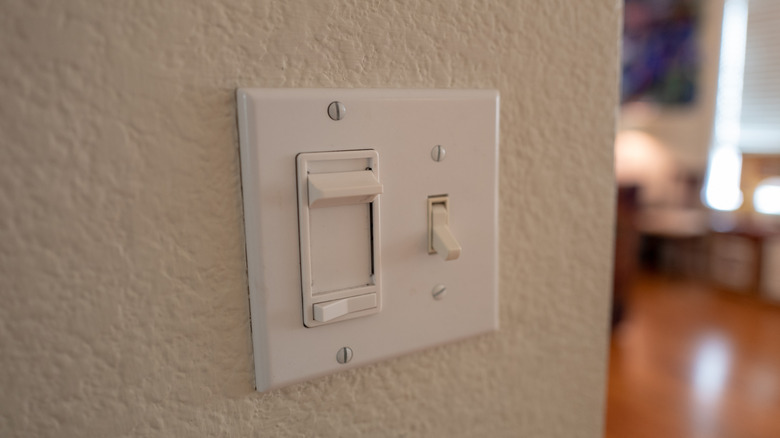The Hidden Downsides Of Smart Bulbs Every Homeowner Should Know
At this point, you have most likely heard of smart bulbs and might have even considered getting them. Smart lights offer a ton of ways to personalize your home, thanks to their great color options and ease of use. Not to mention that you can turn the bulbs on or off, change the color, and even set them up on a schedule from the convenience of your smartphone. However, this fun tech does have some noteworthy downsides. The bulbs can be troublesome in homes with poor Wi-Fi connectivity, they don't always play nicely with existing dimmer switches, and they have the potential to be hacked.
One of the biggest concerns about smart bulbs is that they aren't a great fit for homes with poor Wi-Fi connectivity. Since not every home has access to a good internet provider with ultra-fast speeds, this can create a problem. Smart bulbs require a constant connection to your home network in order to function correctly. Therefore, if your internet is spotty, you may have trouble connecting to and using the lights. Plus, this can lead the issues with any companion apps and even interrupt voice commands.
Similarly, smart bulbs might not be ideal for homeowners who dislike using smart devices to control their home. This is understandable since setting this kind of tech up can often be confusing and stressful. Not everyone wants to download yet another app onto their phone, or wants to be stuck figuring out how to navigate said app just to turn their lights on.
They can clash with dimmer switches and custom fixtures
A more serious disadvantage to smart lights is that they are often incompatible with existing dimmer switches. The problem here is twofold, with the first being that dimmer switches work by regulating the quantity of electricity supplied to a bulb and the second being that smart bulbs have built-in dimming capabilities. Putting those two together can cause issues like buzzing noises, inconsistent dimming, flickering, and even damage to the bulb.
Smart bulbs need constant power to stay connected to your internet network in order to receive commands — as does any smart technology integrations in your home. As such, if you turn off a traditional wall switch, your bulb simply won't work. There are a few solutions to this, though. One, replace the dimmer switch with a standard switch, and leave it set to on so you can control it through the app. Or two, replace the dimmer switch with either a smart dimmer switch or smart switch with a smart bulb mode. These options can play nice with smart lights as they work the same way. Another option is to use non-smart dimmable bulbs with a smart dimmer switch. This is great if you only care about dimming, and not any other smart features.
Smart bulbs are vulnerable to hacking
Perhaps the most serious downside to smart bulbs is that they are vulnerable to hacking (although any smart device brings this same risk with it). Since these bulbs rely on Wi-Fi to receive commands, they can become a tempting target for hackers to access unsecured home networks.
For the average homeowner, this can be problematic in a few ways. First, though it might seem weird or trivial, a compromised smart bulb offers hackers an entryway to your entire home network. Once a hacker gains access, they can potentially access your other smart tech, and even whatever you access on your computer. On the upside, this type of attack isn't super common for individual homeowners. However, you can help reduce the likelihood of it happening to you by changing any default passwords you used during the initial setup, by enabling two-factor authentication, and by keeping your smart bulb's firmware up to date. Just as you likely want the best security system for your home, you probably want to ensure your home's digital security as well.
Even though smart bulbs offer some nice perks, they can bring some downsides with them. Many of the conveniences they advertise may turn out to be aggravations for some users, not to mention potential risks like hacking. It's important to make an informed decision as to whether they're a good fit for your home or not.


